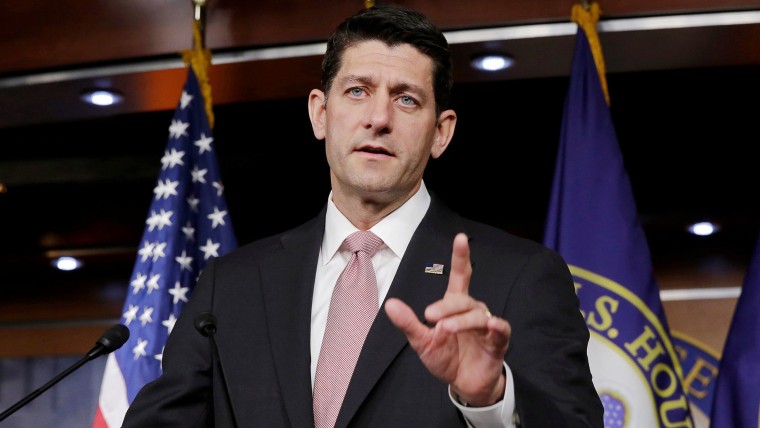House Speaker Paul Ryan (R-Wis.) has largely pulled off an impressive public-relations gambit in recent years. The Republican leader has recast himself as an anti-poverty crusader, without making any meaningful changes to his far-right agenda, simply by using the word "poverty" a whole lot.
But it's occasionally worthwhile to look past the rhetoric and focus on the hard data. The Washington Post reported the other day:
The House Republicans' proposal for tax relief could force the government to borrow trillions of dollars to continue operating and might even weaken the economy, according to a new analysis from the nonpartisan Tax Policy Center.By 2025, when the reductions would be fully implemented, 99.6 percent of the tax cuts would benefit the wealthiest 1 percent of Americans, according to the analysis. This group would enjoy the greatest relief as a share of their income (increasing their incomes after taxes by 10.6 percent on average) and in terms of dollars (an average annual savings of $240,000 for each household).
The full Tax Policy Center report is online here.
I can appreciate why a bunch of statistics may be difficult to digest, but let these findings sink in for a minute. Ryan's tax plan is crafted in such a way as to give 99.6% of the benefits to the wealthiest of the wealthy by 2025. The other 0.4% would be divided up across the other 99% of us.
This is a feature, not a bug, of the House Speaker's approach to economic policy. Ryan genuinely believes that massive tax breaks for those at the very top will spur economic growth that would, in time, benefit everyone. For the Wisconsin congressman, trickle-down policy, its track record notwithstanding, remains the most responsible course to broad national prosperity.
If that means designing a tax plan that's ridiculously tilted towards the rich, so be it. Anyone who questions the wisdom of such a proposal will face accusations of "class warfare" -- a phrase intended to end all conversations -- as if Ryan isn't trying to redistribute wealth from the bottom up.
New York's Jon Chait joked yesterday, "The new Paul Ryan tax cuts make the Bush tax cuts look like socialism."That's hardly an exaggeration. The Bush/Cheney tax cuts cost the nation dearly, failed to deliver the promised results, and heavily favored the wealthiest Americans, but Ryan's "Better Way" agenda is vastly worse.
In March, asked about tax reform, the House Speaker told CNBC, "I do not like the idea of buying into these distributional tables." In other words, Ryan doesn't like any kind of analysis that shows who benefits most (and least) from his economic plans.
"People don't think like that. People want to know the deck is fair," Ryan said. "Bernie Sanders talks about that stuff. That's not who we are."
Instead, Ryan believes, we are a people who'll vote for Republicans who'll approve massive tax breaks, 99.6% of which will go to the wealthiest of the wealthy. That way, apparently, we'll know "the deck is fair."
